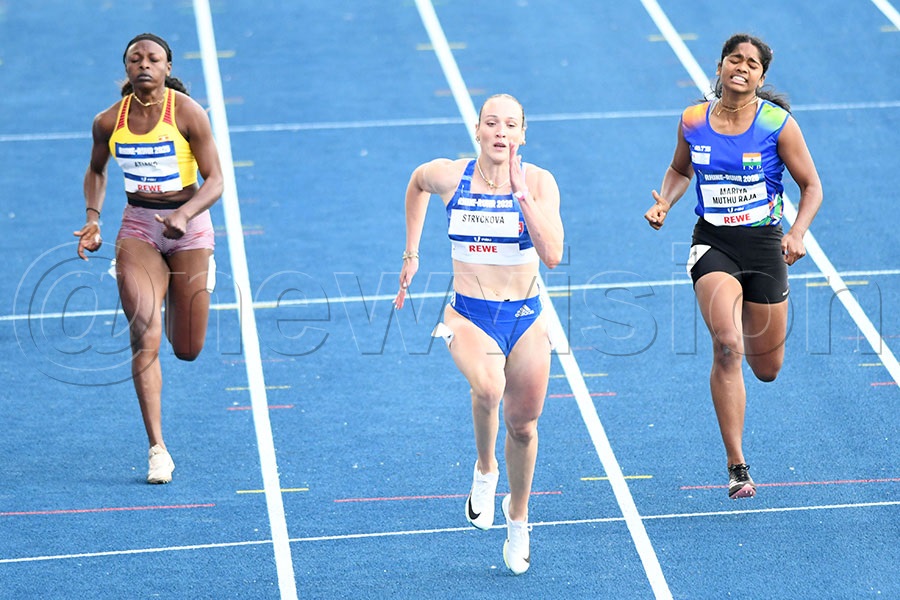Uganda gains valuable lesson from the FISU games
Seth Akampa, the reigning world cross-country gold medalist and team captain, was expected to be Uganda's biggest medal prospect.
Uganda's Seth Akampa (3rd left) keeps up with the leading pack during the 10000m race of the FISU World University Games a at the Lohrheidestadion in Bochum; July 23, 2025. Photo by Michael Nsubuga
Ugandan athletes learned valuable lessons from this year’s Rhine-Ruhr FISU World University Games, which they hope to build upon in future events.
For the first time, Uganda returned from the Games without any medals due to the stiff competition from over 8,000 athletes from 104 participating countries.
Seth Akampa, the reigning world cross-country gold medalist and team captain, was expected to be Uganda's biggest medal prospect.
However, he did not perform as expected in the 10000 m race. As Akampa prepares to graduate from Bishop Stuart University, his career outside of university sports is about to begin.
“I have many goals to accomplish in this sport in the coming period. I want to be the face of athletics in the greater western region of Ankole, Tooro, Rwenzori, and Kigezi,” Akampa said.

Mercy Charity Atiang (left), Slovakia\s Viktória STRÝCKOVÁ and India's Angelsilvia MARIYA MUTHU RAJA in action during the 100m competition of the FISU World University Games at the Lohrheidestadion ib Bochum. Photo by Michael Nsubuga
“I want to prove that our region can also produce stars in athletics before I retire. I feel I’m late in starting to participate in other international competitions of a higher level, and that’s where I’m focusing now. I will go back home to re-strategize with my coach, Gordon Ahimbisibwe, to discuss my future in the sport.”
“I view the experience in Germany as a setback, but I’m glad I ran and finished. I’ll draw lessons from it for my future workouts and races,” he added.
Badminton player Fadhila Shamika made history as the first African player to reach the round of 16 at this level. She aims to build on this achievement and challenge players from Asia and Europe in future competitions.
“My goal is to elevate African and Ugandan badminton to the highest level and show that we can compete with the best players. I really feel I’m on the right track, and I’m grateful for the opportunity,” Shamika stated.
Other Ugandan representatives emphasized the need for hard work to secure medals at this level. “These are the junior Olympics, and only through good preparation and hard work can one succeed,” noted 800m athlete Edreen Tenywa.
Bridget Mbwali remarked, “I learned big lessons. We have to work harder.”
Sprinter Mercy Charity Atiang felt her preparations were adequate but struggled to keep pace with the front runners. “I performed my best, but I need to improve my tactics,” she said. The AUUS administration also recognized the need to change their training and preparation strategies for future Games, given that Uganda has not secured any medals since 2003.
“The competition level has been much higher compared to the post-COVID period in which we last competed. Many of our competitors this time were in their first years, which resulted in a lot of inexperience, despite them being the best back home and in East Africa,” Ssebuliba observed.
He noted that traditionally, East African competition has been the benchmark for selecting Uganda’s team for such events, but it may be time to assess players in even bigger competitions before sending them to the World Championship.
“We must prepare better for the 2027 competition. We need to involve our athletes in a series of trials. Fortunately, the All-Africa University Games are coming up in Egypt, which will provide an excellent opportunity to test our athletes,” he added.
“We also aim to organize a three-month residential training camp before the Games, despite financial challenges. We are grateful for what some of our athletes achieved, and we have learned from this championship,” Ssebuliba concluded.